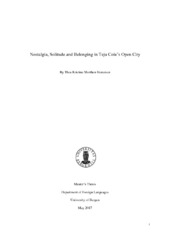| dc.description.abstract | This master thesis concerns the main character in Teju Cole’s Open City, first published in the United States of America in 2011. The character is called Julius and is also the first person narrator in the novel. This means that the actions and depictions visible to the reader are revealed through Julius’ perspective. Julius is a young adult immigrant living in New York City, but his past home was Africa. He has a German mother and an African father, meaning that his cultural background is complex. What I am discussing in my thesis is the way various themes such as nostalgia, solitude and belonging are depicted through Julius, how he can be seen as to represent a modern man’s feelings and experiences because there is a link between fiction and reality, and how he can be seen as an unreliable narrator that is affected by his past to an extent where he has repressed elements of his past that are confronting him in the future. I am investigating how Julius can be seen to be experiencing reflective nostalgia and how he has an ambivalent relationship to his own past. His reflective nostalgia can be seen, in my interpretation of the character after exploring him, to be directed towards the presence in understanding his nostalgia to be sideways directed and neither towards the past, nor the future. This is exemplified by showing to how other characters and Julius’ encounter with them illuminate various aspects of Julius and his characteristics, in addition to how sensory impressions and experiences can bring the past into the presence and affect him. Moreover, I discuss how I perceive Julius to express solitude; a solitude that cannot be minimalized by people surrounding him. His complexity is elucidated and discussed to be polyphonic, similarly to the work in its totality, and this amplifies his consistent solitude. Julius continuously flees from his reality and challenges by walking aimlessly, and his mind also wanders in these walks, between times, places and episodes. This illuminates how he can be seen to be a fugueur. Julius’ frequently aimless wandering may be motivated by his feelings of a non-belonging to the society where he lives and that he therefore searches for something or someone to feel belonging to. He is searching for his identity. In his totality this character can be seen as a “loiterly subject” and I will show to how he fits into certain characteristics of this subject. Finally, I will point to how Julius’ credibility is drastically weakened when the reader, who is allowed to explore Julius’ open mind together with the development of the novel, discovers together with Julius that aspects of his past are repressed. This shows how he may have taken on the role as the hero of his own story when he might in fact be the villain. After careful and detailed reading of the novel countless times I, as a reader, will argue that the story told by Julius including his experiences affects me to the extent that I get access to his open mind, which to a great extent can be compared to my own mind, or anybody’s. Therefore, I feel with this character, interpret him and recognise and notice his hidden nostalgia, which is difficult to spot immediately, his solitude and his sense of not finding his place. The plot’s development is not particularly progressive, but rather directed in different directions continuously, which makes me better understand the complex relationship between humans’ past and present, and how we are constantly affected by, and falls back to, our memories, and how this is represented through Julius. I therefore want to argue that this novel can give us an important insight into a modern immigrant’s mind and that my discussions in this thesis illuminate themes and topics that are crucially important in today’s globalised world. | en_US |
